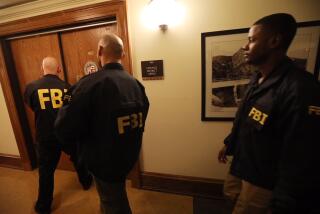Councilman Quits Renewal Post to Avoid Any Conflict
- Share via
NORWALK — Councilman Luigi Vernola, a local commercial property owner, said he has resigned as a director of the city’s Redevelopment Agency to avoid future questions about potential conflicts of interest.
But Vernola emphasized that his resignation last week was not related to a district attorney’s inquiry into whether he may have violated state conflict-of-interest laws. Vernola will remain a member of the City Council.
A district attorney’s investigator has been assigned to determine whether a full-fledged investigation should be opened into whether Vernola had a conflict of interest when he gave his brother money three years ago to buy property in a city redevelopment zone. No decision has been reached, said a spokesman in the district attorney’s office.
Confident of Legality
Council members also sit as directors of the Norwalk Redevelopment Agency and cast votes that could affect the value of property in redevelopment zones. State law prohibits public officials from using their offices for personal financial benefit.
In an interview, Vernola reiterated that he is confident that he broke no law with the 1985 gift to his brother. The councilman said he will not benefit from the investment.
Vernola, who owns property within and outside development zones in Norwalk, said he could not properly serve the city if he were required to abstain on numerousredevelopment votes that might remotely affect his property. In recent weeks, Vernola has abstained from voting on agency business that could pose a potential conflict of interest. He has asked the City Council to appoint a replacement, who would be the first non-council member to be a director of the Redevelopment Agency, City Atty. J. Kenneth Brown said.
“That (the district attorney’s inquiry) had nothing to do with it,” Vernola said. “My primary interest was to serve (the city). I don’t want to bring any kind of feeling that anything was wrong with my vote.”
Mayor Marcial (Rod) Rodriguez said the council, at its meeting next month, will discuss when it will appoint a replacement.
Rodriguez, a longtime friend of Vernola, said he agreed with the councilman’s decision because the Redevelopment Agency needs five directors to be able to move forward with its redevelopment program.
“The last thing (Vernola) wants to do is hurt the process,” Rodriguez said. “We’ve got to move ahead to accomplish those things.”
The district attorney’s office began its inquiry earlier this month. A decision on whether to open a full-fledged investigation is not expected until next month, said Lt. Duane Trump of the district attorney’s office.
Vernola was a Norwalk planning commissioner when he gave his brother an undisclosed amount of money to invest in a parcel of land that was the site of Dial Chevrolet on Firestone Boulevard. The owners of the dealership moved their business in August to neighboring Santa Fe Springs.
Norman Stutzke, a friend of the Vernolas and president of Keystone Ford on Imperial Boulevard, bought the parcel in 1986. The councilman’s brother, Mike Vernola, became Stutzke’s partner a short time later. Stutzke acquired the remaining parcel of the 3-acre site in October. Stutzke, the controlling partner, said he may move all or part of his dealership to the site, which is now vacant.
Councilman Vernola said he had been considering acquiring the site to expand his family-run business. But he decided against the acquisition, in part, because he received legal advice that such a move could constitute a conflict of interest for a planning commissioner. He then gave his brother the money to help him take advantage of the investment opportunity, the councilman said.
The councilman owns two automotive garages, a service station and a towing service. Mike Vernola manages the towing services.
The Redevelopment Agency was not involved in the purchase of the former Dial Chevrolet site, a city redevelopment official said.
Redevelopment agencies improve areas, for example, by using tax dollars to subsidize new business development or to rehabilitate existing businesses in the zones. In addition, redevelopment money is often used to fund public improvements, such as new sidewalks, that could increase property values.
More to Read
Sign up for Essential California
The most important California stories and recommendations in your inbox every morning.
You may occasionally receive promotional content from the Los Angeles Times.













